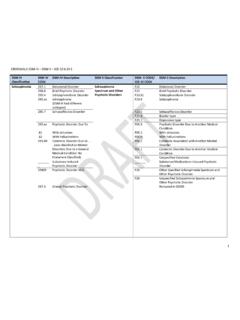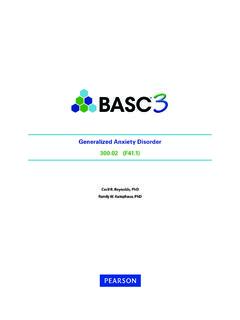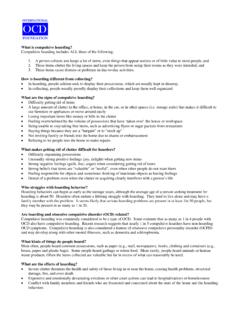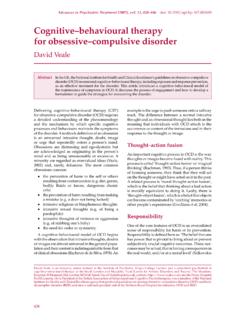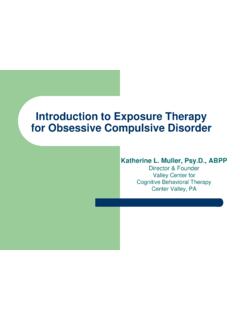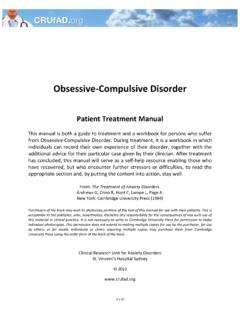Transcription of Helpling Your Child with Obsessive Compulsive Disorder
1 Make a differenceHelping your Childwith ObsessiveCompulsive DisorderA Parent / Carer Self Help GuideBy Dr Lisa Summerhill and Jo RangerCoventry and Produced by Coventry CAMHSDr Lisa Summerhill, Child Clinical PsychologistJo Ranger, Social WorkerWith special thanks tothe parents and young people of Coventry CAMHSwho helped us to develop these booklets 2010 Coventry and Warwickshire Partnership rights you require this booklet in a different format or language please contact the Equality and Diversity Department on 024 7653 6802 Trust HeadquartersCoventry and Warwickshire Partnership NHS TrustWayside House, Wilsons Lane, Coventry CV6 6 NYTel: 024 7636 2100 Fax: 024 7636 894912 ContentsWhat is Obsessive Compulsive Disorder ?
2 2 How many People have OCD? .. 4 What Causes OCD? .. 5 Effect of OCD on your Child .. 5 Understanding the Impact on you and your Family .. 6 What can be done to help? .. 8 Role of Parents .. 9 Your Child and OCD in the School Context .. 10 Treatment for OCD .. 11 Helpful Resources .. 14 What is Obsessive Compulsive Disorder ?OCD is an anxiety (worry) Disorder , which consists ofobsessions and intrusive, repetitive and unwanted thoughtsthat your Child may experience, usually accompanied by high levels of anxiety, guilt and a sense of responsibility. Typical Obsessions may include.
3 Fears about contamination / germs ( fear of touchingdoor handles) Fear that something bad may happen to themselves or theirloved ones ( fear that a parent may die or be attacked) Health related obsessions ( fear of catching a sickness bug) Religious or moral obsessions ( worrying that they mighthave offended God) Sexual obsessions ( unwanted sexual images / thoughts) Magical obsessions ( giving special meaning to certainwords, or numbers, or thinking that thoughts can make orprevent things happening)34 Compulsions, sometimes called rituals, are the things yourchild does to reduce the anxiety or guilt caused by theobsessional thoughts.
4 Some compulsions will be obvious to you, others may Compulsions may include:Things you might see: Washing and cleaning compulsions ( hand washing,washing clothes that are not visibly dirty) Checking compulsions ( checking the doors are locked or plug sockets are off) Repeating compulsions ( re-writing work, going in and out of a doorway or tapping things a certain number of times) Needing to have things arranged, symmetrical or in aparticular you might not see: Counting compulsions ( counting in head, counting steps) Repeating compulsions ( repeating certain phrases in head, saying the same prayer repeatedly)A word of conditions with similar symptomsThere are some other conditions that may have some similarsymptoms to OCD.
5 It is important that your Child has a diagnosisof OCD before following the advice in this booklet. This isbecause the other conditions need to be treated in different ways. It is also important to remember that some of these behavioursmight be seen in younger children as a normal part of theirdevelopment. All children at different stages worry about differentthings. It only becomes a problem when it lasts a long time andinterferes with daily living. How many People have OCD?Research tells us that OCD occurs in about - 3% of theteenage population, which works out as approximately one tothree in every 100 causes OCD?
6 At the moment, no one knows exactly what causes OCD, butthere are some factors that research has shown can possiblymake children more vulnerable to OCD. It is thought that somechildren are genetically more likely to be anxious, somechildren s temperament mean that they are more likely todevelop anxiety related disorders , and OCD is sometimestriggered by an event that a Child may perceive as life events such as staying overnight away fromhome for the first time, exams, bullying, health problems, changein family circumstances and bereavement may also be linked to theonset or worsening of OCD majority of children will have real, understandable anxietyin such circumstances, but if a Child is vulnerable to developingOCD.
7 These things can act as a of OCD on your childOCD may affect your Child in a number of ways. School work,home life, and friendships can often be affected. Some childrenare too young to realise that their thoughts and actions areunusual. Your Child may not understand or be able to explainwhy they must go through their rituals. If your Child is older theymay feel embarrassed, they don't want to be different fromtheir peers and may worry that they are going crazy . Childrenwith OCD sometimes experience extreme anxiety,embarrassment, low self-esteem and sometimes even some children there is a real fear that their thoughts will cometrue if they do not do something to prevent it.
8 This can leave themfeeling overly responsible for themselves and other people. They then become trapped in carrying out compulsions in order toprevent the predicted bad things from happening. This means yourchild does not have the opportunity to learn that if they do notcomplete the compulsion, the bad things they have been thinkingabout do not come true and keeps them trapped in this negativepattern of thoughts, feelings and behaviours. It is important to remember that sometimes a young personknows that they do not need to complete a compulsion, but it is difficult to stop (like giving up a bad habit).
9 They do not dothese things deliberately. 78 Understanding the impact on you and your familyCaring for children with OCD can be an extremely hard,stressful and draining experience, which is difficult to sharewith others. Often a Child s obsessions and compulsionsdominate family life, which in turn can create tensionbetween family members. You might find that you feel moreangry with your Child , which could lead to more parents feel guilty if the Disorder has run in the family or feel maybe it is caused by their parenting. It is important to remember that OCD is not caused by bad of children with OCD may also experience significantstress because of the OCD behaviours.
10 Sometimes they areteased by their peers because of their sibling's bizarre behaviour. They may even be reluctant to invite friends home, and may feel that you have more time for their siblingthan for are not on your ownGiven the strain that OCD can have on your family, you mayfind it helpful to share your worries and experiences with otherparents who have children with OCD. The OCD-UK onlineBulletin Board forums have a section specifically for family and friends, and are free to use at The resources section of this booklet highlights sources of further support. What can be done to help?



